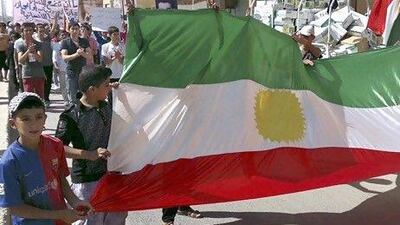DERIK, SYRIA // At first glance the scene in the classroom at the school in Derik does not seem unusual, a teacher flits from pupil to pupil, checking their work over their shoulders.
But the verb conjugations on the whiteboard are in the outlawed Kurdish language, a lesson that would have been unthinkable before the uprising.
While the rebel war against the regime of Syrian president, Bashar Al Assad, has engulfed much of Syria, the Kurdish enclaves of the north-east have largely been spared the worst of the violence. This has afforded Kurds the opportunity to assert their cultural identity after decades of oppression.
"It is an honour for me to teach the young children Kurdish, here in a government school," says Farida Sayeed, a 25-year-old dressed in a flower print shirt and jeans, who works as a hairdresser hairdresser when she is not volunteering at the town's main school. The children gathered are aged between six and 10, but other classes cater to adults and women.
A traditional source of opposition to the regime, the Kurds - who comprise up to 10 per cent of Syria's population - have historically faced systematic discrimination, with restrictions on the use of their language in schools and Kurdish music.
After regime forces pulled out of the centres of many villages and towns in Al Hasaka province following clashes with Kurdish forces in July, Kurdish language lessons were introduced at state schools in the evenings,
In Derik - also known as Al Malikiya - schools have over the past month begun running them in the course of the normal school day.
Institutions in the town of 26,000 people are scrambling to find qualified teachers and books to keep up with the demand.
"There aren't enough people who know writing and high speaking," says Aozan Dershawi, an engineer who volunteers at the newly established Badr Khan language centre, which has 25 pupils enrolled.
"I haven't had any formal training in Kurdish, but I'm also poet and writer and have taught myself."
Language lessons are not the only cultural activities that are thriving.
Kurdish singers have long faced arrest and harassment from authorities, but now they are finding a voice.
In Derik's new Democratic Cultural Centre - formerly the Arab Cultural Centre - a group of five musicians are practising Kurdish folk songs, backed by the keyboard and tanbur - a traditional long-necked lute.
They are part of a music and theatre group called Judi, which was established in 1986.
But their forthcoming performance at the cultural centre will be the first time they have been allowed to grace the stage there.
"We've always had to practise in secret outside of the city because the government made so many problems for us," says Zedan Sheikhi, head of music at Judi, explaining that after last Nowruz - the Kurdish new year celebrations, the group had to go into hiding after a performance.
He regales the story of Saeed Gabari, a famous Kurdish singer that was detained by the authorities, when he was released he had been blinded.
Mr Sheikhi also reeled off the names of others who have spent time in prison for their art.
In 2010 members of a Derik band were arrested for signing patriotic songs at a wedding.
"There are two kinds of song; if you sing about love and life, the punishment wouldn't be so bad, but if you sang about politics or the Kurdish motherland, it would not be tolerated," said Mr Sheikhi.
Throughout this small mixed but largely Assyrian Christian and Muslim Kurdish town a stone's throw from the Turkish border, there is an air of limbo.
While Kurds meet at the cultural centre in the evenings - the Baath party employees who ran the old Arab Cultural Centre still run the building until 1pm.
"They are employees, we didn't want to kick them out," said Mr Sheikhi.
It is a similar scene at the town's schools, where the administration remains loyal to the regime.
While Al Assad's government has little visible presence on the streets, army checkpoints still sit on the edge of the town, though they are easily circumnavigated.
The sense of liberation is tinged with apprehension and awareness that it could be taken away in an instant. Sitting on some of the country's most valuable oil reserves, there is a fear that the fighting will inevitably move to Al Hasaka.
The Kurds have at times enjoyed sporadic periods of de facto autonomy under the governments of Baghdad, Tehran, Damascus and Ankara, but they have also often paid dearly for attempts to grab freedom, including Saddam Hussain's genocidal Al Anfal campaign, which destroyed thousands of Kurdish villages and culminated in a poison gas attack on the city of Halabja in 1988.
But Syria's Kurds are attempting to learn from past mistakes, quietly building an armed militia which it hopes will be able to protect Kurdish interests in a post-Assad era, whatever form the government takes.
People's Protection Units patrol the border armed with Duska machine guns and AK-47s.
In the mean time, Berevan Sheiki, a 21-year-old member of Judi, said she would make the most of her new-found freedoms.
"I came here before and sang in Arabic," she said. "Now I feel free. When you sing in your mother language, you feel free."

